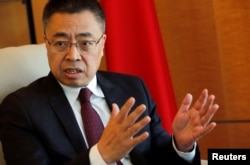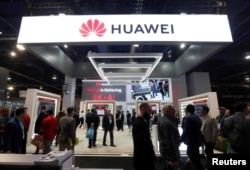China has given up its long-held resistance to the World Trade Organization’s push for global standards for the $27 trillion e-commerce market. Some analysts say this is a direct result of the trade war with the United States, which is forcing China to seek wider cooperation with trading countries.
In the largely unmanaged electronic commerce industry, or e-commerce, China has emerged as a major player accounting for one-fifth of the global market. Its lead company, Alibaba, trades in 200 different countries, playing a crucial role in China’s export growth.
E-commerce did not take off until after the WTO was created in 1995, and there is a big need for global standards.
Joint statement
Late last week China joined the United States and 75 other countries in signing a joint statement intended to jump-start negotiations for creating rules that would ensure transparency and reduce barriers in cross-border sales.
The move is a “sign that China has agreed to discuss the notion of rules for a rapidly emerging area of commerce,” said Lauren A. Johnston, a senior research associate at Mercator Institute of China Studies in Berlin.
Oliver Rui, CIEBS professor in Shanghai adds that it also dovetails with China’s interests.
“China has the largest e-commerce industry in the world. Joining the WTO talks will benefit the country’s e-commerce industry. Globalization is China’s national strategy,” he said.
New area of conflict
China’s shift in mood is believed to have been driven by trade frictions with the United States and growing resistance to Chinese trade practices in Europe.
There are signs the Washington and Beijing may clash during negotiations at WTO’s rule-making process, giving a new dimension to the trade war between the two countries.
China is already giving signs that it would dispute parts of the present draft of rules on e-commerce.
“To be very frank, the current text of the joint statement before us, in our view, could have been better drafted if time allows,” Chinese envoy Zhang Xiangchen to WTO said last week.
“I think the e-commerce initiative is promising, but we are a long way from being able to forecast what the results might be,” said Nicholas R. Lardy, senior fellow at the Peterson Institute for International Economics.
The new WTO rules will also address the controversial issue of forced data localization. Foreign companies often complain that they are forced to store their data within China’s geographical area, making it difficult to protect intellectual property rights.
“It (China) just as well could seek to slow down talks as much as promote liberalization,” said Scott Kennedy, director of the CSIS Project on Chinese Business & Political Economy.
E-commerce rules crucial
Making rules for the uncontrolled e-commerce industry is crucial for the World Trade Organization, which is under U.S. pressure for not being able to rein in what it regards as China’s unfair trade practices. Last year, President Donald Trump threatened to withdraw from the WTO if it does not “shape-up.”
“The WTO is not well-equipped to handle the fundamental challenge posed by China, which continues to embrace a state-led, mercantilist approach to the economy and trade,” U.S. Trade Ambassador Dennis Shea said recently.
Speaking at a WTO meeting last month, China’s envoy Zhang said U.S. tariffs on Chinese products like steel and aluminum are a sign of protectionism under the guise of dubious national security concerns. He also claimed the United States has blocked the selection of judges, thus paralyzing the WTO’s judicial system.
Huawei battle
China’s willingness to work together with other countries and establish WTO rules is in sharp contrast, however, to its handling of the matter regarding tech giant Huawei. And while Beijing’s decision to join the WTO rule-making process has been widely welcomed, its flat rejection of U.S. Justice Department charges against Huawei has not.
China has called the charges against Huawei and its chief financial officer Meng Wanzhou a politically driven campaign to suppress Chinese companies. State media has often argued that the United States is trying to suppress Chinese growth because it has fallen behind in certain technologies and refuses to accept this reality.
“I think that’s funny. By every measure, innovation in U.S. is in front of China, and this is not (about) the U.S. is worried that China is constantly on the rise or becoming more successful in innovation or certain markets,” said Scott Kennedy of CSIS.
“This is about how China is pursuing its technology agenda, about stealing of technology, violation of intellectual property rights. That’s the concern,” he said.
In fact, the Chinese government and the state media are giving the impression that protecting Huawei is a national cause.
“Huawei and company president Ren Zhengfei, please don’t give up. The Chinese people support you and so does the world’s silent majority,” the Communist Party-backed Global Times said in an editorial.
There is also concern that China might resort to a tit-for-tat policy by initiating investigations against American companies. Two Canadian nationals have detained allegedly for harming national security since Huawei’s Meng was put under house arrest in Canada. China has also retried a Canadian citizen accused of drug smuggling and sentenced him to death.







